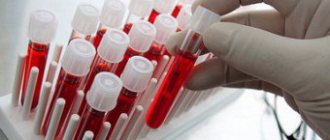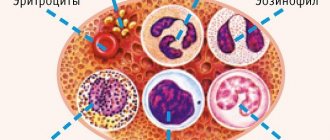Triple test, or “prenatal risk assessment”: hCG, AFP and free estriol
The main purpose of blood tests during pregnancy is to determine the risk of pathologies in the fetus.
The “triple test” is a test of a pregnant woman’s blood for the level of hCG, AFP and free estriol. The test is carried out between the 16th and 18th weeks of pregnancy, in the morning, strictly on an empty stomach . The doctor at the antenatal clinic is obliged to refer the expectant mother to this study. A special program calculates the risk of having a child with Down syndrome, the risk of NTD (this abbreviation refers to certain groups of congenital malformations) and the risk of fetal growth retardation. As a result, you are given a result containing incomprehensible numbers and letters.
So, let's figure out what all these abbreviations, numbers, letters mean and what their meaning is for us.
What is AFP and why do you need to know its level in the blood during pregnancy?
The happy time of pregnancy in the life of every woman is filled with a wide variety of feelings and concerns. There are a lot of worries - you need to constantly monitor your health, change your lifestyle and rhythm of life, because the future fate of the woman, her family and the unborn child depends on this. The only way to successfully overcome this path is to listen to the advice and recommendations of your doctor, follow all his instructions and get tested on time.
AFP is an abbreviation for α-fetoprotein (alphafetoprotein), a type of bipartite (consists of a polypeptide “strand” and a polysaccharide) glycoprotein proteins. Despite the complexity of its structure, this protein belongs to the so-called “protoproteins” - ancient organic formations, whose existence is estimated at millions of years.
AFP functions
This type of protein begins to be synthesized in the female body in the first weeks of gestation. It is produced by the corpus luteum (part of the follicular apparatus of the ovaries) and performs a transfer function, ensuring the transport of polyunsaturated fatty acids from the blood of a pregnant woman to the blood of the fetus, where the latter perform nutritional and construction roles.
Under normal conditions, in the absence of gestation or liver cancer, the body does not produce AFP. The transport function is performed by proteins close to α-fetoproteins - albumins, more specifically - serum albumin (SA). It makes up the membranes of red blood cells, and thanks to it, red blood cells are able to carry useful substances in the body.
The difference between AFP and SA is that cell membranes built from AFP have a more strict osmotic function, that is, the permeability of the membranes is stricter than that of erythrocytes, more selective, focused on specific chemicals. Why is this necessary? Medical science cannot yet give an exact answer. The most likely idea remains that this mechanism is directly related to the protection of the fetus from the immune system. Moreover, this protection works on both sides of the biological barrier: AFP protects the fetus both from its own immunity and from the mother’s immunity.
Why is knowing AFP levels useful during gestation?
During gestation, a woman's AFP level is checked for compliance with standards regarding the duration of pregnancy and information obtained using other research methods (ultrasound diagnostics, amniocentesis). If α-fetoprotein values are decreased or increased, this will be evidence of possible pathologies in fetal development.
hCG - human chorionic gonadotropin
- HCG is human chorionic gonadotropin; it begins to be released in a woman’s body immediately after the embryo attaches to the wall of the uterus (this happens approximately on the fourth or fifth day after fertilization). HCG is a placental protein, the level of which characterizes the state of the placenta at a particular stage of pregnancy; it can change if the fetus (and, accordingly, the placenta) has chromosomal abnormalities. The protein level may also reflect the presence of a threat of miscarriage, changes in the placenta due to an infectious lesion, an immunological conflict and for other reasons. An altered hCG level can also be observed during a normal pregnancy (!).
If hCG is low (see below for hCG level norms for each period), this may indicate a threat of miscarriage (if the hormone level decreases progressively by more than 50% of normal), chronic placental insufficiency, post-term pregnancy, as well as antenatal fetal death. If hCG is high, this may indicate a multiple pregnancy (the level of the indicator increases in proportion to the number of fetuses), prolonged pregnancy, a discrepancy between the actual and established gestational age, toxicosis, preeclampsia, diabetes mellitus in the mother, or the use of synthetic gestagens (hormones that promote the normal course of pregnancy). pregnancy). High hCG may also indicate the presence of Down syndrome in the fetus, but only in combination with reduced levels of AFP and free estriol!
Properties and significance for the body
AFP is an abbreviation that stands for “alpha fetoprotein.” AFP analysis during pregnancy is a way to detect and prevent the development of fetal defects.
Alpha-fetoprotein is formed during the development of the embryo and fetus. This protein was discovered in 1944, but scientists have not yet fully studied all its properties and functions. It is known that alpha-fetoprotein is initially produced by the corpus luteum of the ovaries of a pregnant woman, and then, from the 5th week, the fetus can produce it itself.
It is synthesized by the liver and gastrointestinal tract of the embryo; it is a precursor to albumin. Of great importance is the ability of AFP to protect the unborn baby from rejection by the mother’s immune system. Its functions also include transporting oxygen to the fetus.
AFP - alpha fetoprotein
- AFP stands for alpha fetoprotein. This is a protein product that is produced by the baby's liver and enters the mother's blood during pregnancy. Determination of its level is used to exclude the development in the fetus of defects of the neural tube, various parts of the digestive tract, urinary system, as well as Shershevsky-Turner syndrome (an incurable chromosomal disease characterized by congenital defects of the heart and other internal organs, infertility; sometimes - decreased mental development), serious fetal growth retardation, some placental diseases and, finally, Down syndrome.
Low AFP (the normal level for each period, see below) occurs with Down syndrome in the fetus, with a low-lying placenta, obesity, the presence of diabetes mellitus, hypothyroidism and some other diseases in the pregnant woman, as well as with a normal pregnancy (!). There is also a dependence of AFP level on race. If the AFP is high, this may mean that the child may have damage to the nervous system: softening of the spine, absence of all or parts of the brain. With this pathology, a child may be born with paralysis of the lower half of the body and anencephaly (a disease in which the child’s brain is seriously underdeveloped or does not develop at all). Also, an increased level of AFP is observed with an unfavorable course of pregnancy, threat of miscarriage, Rh conflict, oligohydramnios, and intrauterine fetal death. An increased level of AFP during multiple pregnancy is a physiological norm.
Low AFP during pregnancy
An indicator that is too low indicates the following deviations:
- malnutrition (malnutrition);
- hypoxia (oxygen starvation);
- Down syndrome;
- Edwards syndrome (trisomy 18 chromosome),
- Patau syndrome (trisomy 13 chromosome),
- frozen pregnancy;
- intrauterine death;
- diabetes mellitus or gestational diabetes in a pregnant woman;
- obesity of various types;
- low placenta previa;
- endocrine disorders.
E3 or free estriol
- E3 or free estriol is a female sex hormone that is produced by the placenta and fetal liver. As pregnancy progresses, the level of estriol in a woman's blood gradually increases. Estriol improves blood flow through the vessels of the uterus and promotes the development of mammary ducts during pregnancy. A decrease or sharp decrease in estriol (by 40% or more) indicates a pathological condition of the fetus.
Low estriol levels
may indicate a threat of miscarriage or premature birth, postmaturity, fetoplacental insufficiency, fetal hypotrophy (delayed physical growth of the fetus), Rh conflict, anemia in the fetus (decreased hemoglobin), intrauterine infection, adrenal hypoplasia, fetal anencephaly (defects CNS), about heart defects, as well as Down syndrome. Also, a low level of free estriol can be observed in an expectant mother with insufficient nutrition, as well as when taking antibiotics. If estriol is high, this most often indicates a large fetus or multiple pregnancy, it can also indicate liver disease, and only with a sharp (!) rise in the hormone - the likelihood of premature birth. The content of serum markers in the blood of pregnant women changes in accordance with the stage of pregnancy; each laboratory uses its own standards depending on the type of reagents used. When assessing the results, you need to rely only on the standards of the laboratory where you were analyzed. For the convenience of assessing the level of serum markers, values are usually expressed in relative units - MoM (multiples of median - a multiple of the average value). The norm in MoM for any serum marker at any stage of pregnancy is 0.5-2.0 MoM.
High AFP in pregnant women
An increased level of AFP by more than 2-3 times is observed in the following diseases:
- anencephaly (severe pathology of the formation of cranial bones and cerebral hemispheres);
- hydrocephalus;
- spinal malformation (spina bifida);
- kidney and liver defects in the embryo;
- atresia of the esophagus or intestines;
- umbilical hernia, gastroschisis (defect of the anterior abdominal wall),
- teratocarcinoma (cancer) of the yolk sac;
- pathology of the placenta;
- encephalocele (cranial hernia);
- threat of miscarriage or premature delivery;
- large fruit;
- multiple pregnancy, etc.
Important: to diagnose pathology of fetal development, it is necessary to know the exact duration of pregnancy. The AFP level alone cannot serve as a diagnostic criterion.
Alpha-fetoprotein test during pregnancy
Content:
The modern way and rhythm of life relatively often leads to the birth of children with certain developmental anomalies and genetic abnormalities in the functioning of the body. In order to prevent the birth of non-viable newborns or those whose life will be torment for the people around them and the children themselves, intrauterine methods for diagnosing such anomalies are being developed.
Recently, an alpha-fetoprotein (AFP) test , which is recommended for every pregnant woman in the first trimester of gestation (1-12 weeks), optimally at 10-11 weeks. The reliability of this screening analysis reaches 90-95% if it is carried out correctly and verified using additional examination methods. It is officially recognized that an alpha-fetoprotein test is the first step in diagnosing a pathological pregnancy and is by no means the only one.
information This analysis was first carried out in the early 70s of the 20th century, when they began to trace an increase in the concentration of AFP in response to serious and incompatible fetal pathologies.
AFP level: norm and pathology during pregnancy
AFP concentrations outside of pregnancy at different stages of pregnancy vary greatly, and the weekly increase in AFP levels also has certain norm limits identified according to statistical studies. Doctors usually have tables with concentrations of the maximum permissible limits of AFP in each week of gestation. Its values are determined in Me per milliliter of blood. The level is detected starting from 15 weeks of pregnancy; by the period of 32 weeks of pregnancy it should reach its peak values of 200-250IU/ml.
Outside of pregnancy, AFP levels do not exceed 6.6IU/ml.
note
Sometimes, when determining AFP using automatic analyzers, the norms may deviate in one direction or another, and then the permissible limits of fluctuations are indicated on the forms along with the actual numbers, so that the doctor is aware of them and does not make mistakes in interpreting the results.
What is alpha fetoprotein
Alpha fetoprotein (AFP) is a specific protein that is synthesized (produced) by the yolk sac or already formed liver cells (hepatocytes) of the developing embryo or fetus, as well as (up to 5 weeks of pregnancy) by the corpus luteum of the ovaries of the expectant mother.
Alpha-fetoprotein is extremely important for the intrauterine development of the child and performs a number of specific functions:
- are transport proteins and participate in the transfer of necessary proteins from the mother’s blood, which are used to build the child’s cells and tissues, ensuring his growth and development;
- participates in the transfer of essential fats (polyunsaturated fatty acids), which are involved in the formation of cell membranes (membranes), and the last 3-4 weeks of intrauterine life - in the formation of surfactant (a substance that envelops the alveoli in the lungs and ensures human breathing after birth);
- prevents the influence of maternal hormones (estrogens) on the body of a developing child;
- maintains blood pressure in the fetal vessels at a physiological level;
- takes a direct and active part in the formation of natural immunosuppression between the body of the mother and the fetus (i.e., it helps to reduce the production of the woman’s immune cells on the developing child), which leads to pregnancy and does not allow the unborn baby to spontaneously be rejected.
After the 5th week of pregnancy, AFP enters the body of a pregnant woman by absorption into the blood from the amniotic fluid, where it is released by the fetus along with its urine.
important This protein can also be formed during pathological cell growth (tumors) in patients without pregnancy, including men. These are cancers of the liver, ovaries and testicles. Pathological changes in test results occur in about 4-5% of examined patients.
What if the person is “non-pregnant”?
It was stated above that in healthy adults and non-pregnant women, the content of alpha-fetoprotein in the blood is extremely low. In some cases, if liver disease exists, its concentration may increase. But in significant quantities it is found in liver tumors, in malignant neoplasms of the gonads, and in the diagnosis of metastases of various neoplasms in the liver tissue.
In the case of primary liver cancer not associated with metastases, the diagnostic value and interpretation of an increase in the level of this protein is very great. It is a tumor marker and appears in the peripheral blood much earlier than the first clinical signs of the disease that worry the patient. On average, alpha-fetoprotein in patients with primary hepatocellular carcinoma rises 2 months before pain, jaundice and other signs occur. This is important for timely diagnosis and treatment, and also gives a better chance of survival. But high levels of alpha-fetoprotein, as a tumor marker in adults, are described in detail in the article Alpha-fetoprotein (AFP) - a tumor marker.
Indications for analysis
Alpha-fetoprotein testing is recommended for all pregnant women with a gestation period of up to 12 weeks. Repeated tests are prescribed if the first ones were abnormal. Some conditions in pregnant women are strict indications for analysis:
- the child is conceived from blood relatives;
- the birth of a previous child with a developmental defect or hereditary pathology;
- first birth of a woman after 35 years of age;
- negative impact on the body of a pregnant woman of various physical factors (poisons, radiation, etc.);
- a history of infertility in the couple, miscarriages (spontaneous), stillbirths;
- taking medications with a toxic effect on the fetus shortly before pregnancy or in the early stages of gestation;
- the presence of a hereditary pathology or genetic mutation in the future mother and father;
- Carrying out X-ray examinations of women in the early stages of pregnancy.
AFP in pregnant women
As a rule, the tumor marker AFP during pregnancy is rarely determined separately. Most often, the study is carried out as part of a triple screening together with free estriol and hCG. In pregnant women, this method makes it possible to diagnose oncopathologies of the uterus and appendages, mammary glands and liver, and developmental defects of the child. It also makes it possible to predict the development of preeclampsia: an excessively high level of AFP in the blood of women in the 2nd trimester of pregnancy is a risk factor for the development of preeclampsia. Starting from the 10th week, the expectant mother's AFP level gradually increases. By week, its norm is:
| Gestational age: | Values, IU/ml | Values, ng/ml |
| up to 12 weeks | less than 15 | less than 18.07 |
| 13 to 15 weeks | 15-60 | 18,07-72,29 |
| from 15 to 19 weeks | 15-95 | 18,07-114,46 |
| from 20 to 24 weeks | 27 — 125 | 32,53-150,6 |
| from 25 to 27 weeks | 52 — 140 | 62,65-168,67 |
| from 28 to 30 weeks | 67 — 150 | 80,72-180,72 |
| from 31 to 32 weeks | 100 — 250 | 120,48-301,2 |
Important! The interpretation of the results is always carried out comprehensively. It is impossible to make an accurate diagnosis based on only one analysis.
Alpha-fetoprotein reaches its maximum concentration by week 34, after which its level begins to decline.
Alpha Fetoprotein Test Procedure
information Blood is taken from a pregnant woman from a vein. To determine the result, 10 ml is needed. After the material for analysis is taken, it is sent to laboratory assistants to determine the concentration of AFP.
Before coming to blood collection points for alpha-fetoprotein analysis, you should fulfill several simple conditions so that the results are as accurate and informative as possible:
- 10-14 days before the test, you must stop taking any medications , because they, accumulating in the blood and internal organs of a woman, can cause distorted test results for fetal protein;
- 1 day before the test, and alcoholic drinks should be excluded from the diet
- 1-2 days before the AFP test, it is necessary to limit as much as possible any physical activity (including carrying heavy objects, general cleaning of the house, etc.);
- The last meal before the analysis should be in the evening, no later than 21.00 ;
- in the morning, on the day of the analysis, it is allowed to drink only purified water, no more than 100-200 ml , so as not to reduce the true concentration of protein in the mother’s blood;
- The AFP test should be taken in the morning, a few hours after waking up , so the laboratory should be as close as possible to the woman’s place of residence.
What is AFP and what is its role in pregnancy?
AFP concentration is important for normal fetal development because it has many functions:
- transfers special maternal blood proteins that participate in the structure of the baby’s tissues and ensure its development;
- transports polyunsaturated fatty acids necessary for the formation of fetal cell membranes, and in the last month before birth they are involved in the production of a special substance that envelops the pulmonary alveoli and helps the baby breathe after birth;
- blocks the effect of maternal estrogen on the fetus;
- ensures normal pressure in the child’s blood vessels;
- prevents the production of specific maternal immune cells that seek to reject the fetus as a foreign body.
Why do the analysis?
AFP and hCG analyzes are part of a special study to determine the risk of various pathologies in the fetus. HCG (human chorionic gonadotropin) is formed after the embryo attaches to the wall of the uterus. AFP protein is present in a patient who does not have a malignant tumor in her body.
Alpha-fetoprotein has the properties of a protein and delivers the necessary nutrients to the child. Glycoprotein affects the immunity of a pregnant woman and prevents rejection of the embryo. Tests performed during pregnancy help prevent the development of complications and genetic deformities.
The tests are part of the “triple test”, which is carried out during the 2nd perinatal examination.
Preparation and execution
AFP analysis allows us to determine pathologies such as:
- Down syndrome;
- liver and kidney diseases.
For the results of the study to be reliable, it is necessary to properly prepare for the procedure. Blood for AFP and hCG is taken on an empty stomach. The study is carried out until 12 noon.
The procedure is carried out in the 2nd trimester. Alpha-fetoprotein levels are most informative at week 15.
A biochemical study of the hemolymph for hCG determines the pathology in the formation of the embryo. A woman is interested in the question of how to properly prepare for the procedure of donating biological fluid for hCG.
Hemolymph is taken from a vein in an amount of 5 ml. The analysis is done at 8 am; if the procedure is carried out after 12 noon, the patient does not eat for 5 hours before the start of the study.
It is necessary to avoid eating fatty and salty foods. The doctor determines the diagnosis not only based on test results, but also takes into account the clinical picture of the disease.
Methods for studying AFP in the blood of a pregnant woman
Initially, after the discovery of fetoprotein, it was determined in the blood using paper electrophoresis, but currently an enzyme-linked immunosorbent assay (ELISA) is used. It is based on the ability of a protein acting as an antigen to bind to antibodies that contain an enzyme tag.
If the protein is present in the serum, the reaction will be positive. A special apparatus is used to determine the degree of serum dilution and the concentration of AFP in it. This is an important indicator that is relied upon when making a diagnosis. An alternative research method that can be used in some clinics is chemiluminescence.
ELISA is an immunochemical method that can give a false-positive result. The risk of incorrect analysis occurs when women have a large number of proteins similar in structure, as well as a large amount of immunoglobulin M. This is observed in pregnant women with elevated rheumatoid factor, autoimmune diseases, when using certain medications and systemic pathologies.
Normal indicators by week
HCG norm in each trimester in honey/ml:
- the lowest value in the first 14 days is 25-300;
- in the second - 10,000-35,000;
- before childbirth - 10,000-60,000.
The amount of gonadotropin increases by day 42, then decreases. If the pregnancy is multiple, hCG increases exponentially.
A 20% deviation in readings indicates an anomaly in fetal development.
AFP and hCG in the 2nd trimester help identify pregnant women at risk who may experience fetal deformities. Changes in the amount of hormones are checked over several weeks.
The AFP norm is established in the 1st trimester. 2 weeks before birth, the indicators have a maximum value, then they decrease. The hormone level is measured in MOM or U/ml. The standard value is from 0.5 to 2 MoM.
The level of AFP indicators is constantly changing, each week has its own meaning:
- 1st trimester is 15 U/ml;
- 16 weeks - within 15-62 U/ml;
- The 3rd trimester has a maximum value of 100-251 U/ml.
The doctor prescribes a secondary study at week 18, normal AFP levels are 15-95 U/ml and 0.5-2.0 MoM
Interpretation of results
Despite the early appearance of fetoprotein in the blood of the fetus, in a pregnant woman the protein begins to increase from the 10th week. In the serum of a child during intrauterine development, AFP increases at 12-16 weeks of development, remains at this level for a long time and begins to decrease at the end of the 2nd trimester. By the time of birth, it is already insufficient, and during the first year of life it reaches the level of an adult.
During pregnancy, the concentration of protein in the mother's blood differs from that in the child's blood. It begins to increase from the 10th week, and the maximum is reached only at 32-34 weeks of gestation. The optimal period for screening is 15-20 weeks. This time was chosen for the examination so that if developmental abnormalities are detected, treatment can be carried out. In severe cases, when, in addition to chromosomal abnormalities, severe malformations are determined, the woman is offered to terminate the pregnancy for medical reasons, which is allowed to be done up to 22 weeks.
The AFP norm by week of pregnancy changes as follows:
When dynamically assessing the level of AFP, if the analysis was carried out several times, attention is paid not only to absolute numbers, but also to the rate of their growth. After minimum values at week 10, AFP increases by 15% every 7 days until week 25. When studying the relationship with albumin, the concentration of alpha-fetoprotein reaches 10%.
AFP results are not considered separately from other indicators of the triple test or extended study. This can lead to incorrect diagnosis of pathology and the choice of incorrect pregnancy management tactics. Testing is aimed at identifying the following complications and defects:
- cleft neural tube;
- chromosomal abnormalities, more often Down syndrome and Shereshevsky-Turner syndrome;
- some congenital malformations of the digestive tract and kidneys;
- placental insufficiency;
- hemolytic disease of the fetus in late stages.
The analysis cannot determine such defects as hypospadias, cryptorchidism and hydrocele.
Why is the rate increased?
Fetal neural tube defects
High AFP during pregnancy suggests this pathology. The most common diagnosis is spina bifida, which is incomplete closure of the spinal canal. In this case, the meninges protrude and form a hernia. A congenital anomaly does not always lead to the death of a child, but it can cause disability and requires neurosurgical care immediately after birth.
Anencephaly - absence of the brain
If the diagnosis is confirmed by additional research, the fetus is considered nonviable, and the woman is advised to terminate the gestation. Neural tube defects are characterized by an increase in fetoprotein several times compared to the norm. This is due to the leakage of protein through defects in the spinal column directly into the amniotic fluid and further into the mother’s bloodstream.
Indicators are increased when:
- detection of increased echogenicity of the intestine on ultrasound, which cannot be associated with other diseases;
- Shereshevsky-Turner syndrome;
- pregnancy with twins - the concentration naturally increases by 2 times, but it cannot be used to judge the pathology or normal development of the fetus;
- possible Rh conflict between mother and fetus in the 2nd and 3rd trimester;
- severe form of hemolytic disease and intrauterine fetal death;
- lysis of liver cells and release of protein into the bloodstream (with necrosis of the fetal liver caused by a viral infection, an increase in concentration also occurs);
- in complicated pregnancy, in women with severe toxicosis in the 1st trimester, an increase in AFP concentration is associated with the characteristics of protein synthesis in the liver;
- the threat of miscarriage due to an increase in blood pressure in the fetal vessels, so the protein enters the mother’s bloodstream more actively.
A false increase in fetoprotein is associated with systemic pathologies of the mother: systemic lupus erythematosus, dermatitis or acute eczema.
Fetoprotein increases 3 times or more with the following anomalies:
- atresia of the esophagus or duodenum;
- defects of the anterior abdominal wall;
- omphalocele;
- congenital nephrosis;
- polycystic kidney disease;
- renal agenesis;
- epidermolysis bullosa involving the mucous membrane of the digestive tract.
But even in the absence of confirmation of malformations, pregnant women who experienced an increase in AFP at 15-20 weeks are at risk for the development of placental insufficiency and fetal malnutrition.
Causes of decreased alpha-fetoprotein
Down syndrome
Most often, a decrease in AFP is associated with Down syndrome. This is a genomic pathology in which instead of 46 chromosomes the fetus has 47. Analysis for fetoprotein is assessed in conjunction with ultrasound data at 10-12 weeks, the results of which may indicate an increase in the thickness of the cervical fold or abnormalities in the development of the nasal bone.
A low AFP confirms a high risk of Down syndrome in the fetus, but does not provide a 100% guarantee of the development of the disease. Sometimes there are false results in which children are born with a normal set of chromosomes. Therefore, after analysis, additional diagnostics are required. The score for a positive test may be as follows:
- triple test – risk 1:25;
- quadrotest – risk 1:13;
- integrated test – risk 1:3.
Edwards syndrome
Low AFP is observed with division of chromosome 18, or Edwards syndrome. This is a chromosomal pathology with severe developmental defects. Children are born with facial abnormalities, irregular skull shape and low weight. Multiple malformations of large vessels, heart and other organs are observed, which makes newborns non-viable.
Hydatidiform mole
This is an anomaly in which the embryo does not develop, and the chorionic villi form growths in the form of bubbles. A woman may feel all the symptoms of pregnancy, but if she is not registered and the first examination was carried out after 12 weeks, then there is a risk of complications in the form of increased blood pressure and the development of gestosis, proteinuria, and in severe cases, metastases to other organs.
Read more about pathology at the link.
If the gestational age is incorrectly determined, the AFP will be relatively low if the gestational age is overestimated. Therefore, it is important for women to know the day of their last menstruation when registering.
Reasons for deviations and what to do
Tests may have different results. Exceeding the norm of alpha-fetoprotein suggests the development of the following pathology:
- umbilical hernia;
- neural tube defect;
- liver diseases;
- chromosomal disorder;
- excess fetal weight.
Low values suggest miscarriage, abnormal chromosome set, frozen fetus, hydatidiform mole, false pregnancy, diabetes mellitus.
AFP analysis is not 100% proof of pathology; a woman needs to undergo an ultrasound. To determine alpha-fetoprotein, amniotic fluid is studied.
The study makes it possible to prevent pathologies of fetal development. In 5% of cases, the analysis detects deviations from the normal course of pregnancy. A glycoprotein test must be taken in the 2nd trimester. If the result is questionable, the doctor takes measures to maintain the pregnancy.
If AFP is not normal...
An increased blood AFP indicates the possible presence of a pathology, such as:
- Neoplasms – hepatic cell carcinoma, testicular germ cell tumors, teratomas, metastatic liver disease and some cancer sites (stomach, lungs, breast);
- Non-tumor pathology of the liver - cirrhosis, inflammation, alcoholism, previous surgical interventions on the liver (resection of a lobe, for example);
- Disorders of hemostasis and immunity (congenital immunodeficiencies, ataxia-telangiectasia);
- Pathology in obstetrics – developmental anomalies, threat of premature birth, multiple pregnancy.
This is interesting: Precordial stroke: indications, procedure, how and when to apply, result
In pregnant women, AFP is assessed based on the duration of pregnancy and data from other studies (ultrasound, amniocentesis). If there are signs of pathology on ultrasound, there is a high probability that the AFP will also be changed. At the same time, an isolated increase in this protein is not yet a reason to panic, since the interpretation of the analysis should be carried out in conjunction with other results of the examination of the expectant mother.
There are cases where a woman ignored elevated AFP and refused procedures such as amniocentesis or chorionic villus sampling, and subsequently gave birth to a healthy baby . On the other hand, some defects may not cause fluctuations in this indicator. In any case, AFP testing is included in the screening program during pregnancy, so it needs to be determined one way or another, and what to do then is decided by the woman together with the antenatal clinic doctor.
Elevated AFP, along with severe defects proven by ultrasound, often requires termination of pregnancy, since the fetus may die before birth or be born non-viable. Due to the lack of specificity and a clearly established connection between the amount of AFP and malformations, this indicator alone cannot be the basis for any conclusions. Thus, increased AFP together with neural tube defects are observed in only 10% of pregnant women; the remaining women give birth to healthy children.
Thus, AFP can be an important indicator and even one of the first signs of pathology, but by no means the only one ; it should always be supplemented by other studies.
In obstetrics, a blood test for AFP can indirectly indicate such fetal malformations as:
- Deviations from the nervous system - absence of the brain, spina bifida, hydrocephalus;
- Defects of the urinary system - polycystic disease, renal aplasia;
- Umbilical hernias, defects of the anterior abdominal wall;
- Violation of bone tissue formation, osteodysplasia;
- Intrauterine teratoma.
A sign of trouble can be not only an increase, but also a decrease in the level of AFP, which is observed with:
- Chromosomal pathology – Down syndrome, Edwards syndrome, Patau syndrome;
- Intrauterine fetal death;
- The presence of obesity in the expectant mother;
- Violation of the formation of the placenta - hydatidiform mole.
Based on the listed possible manifestations of changes in AFP levels, it becomes clear that both an increase and a decrease in it should be a reason for close attention to the patient and requires further examination.
When alpha-fetoprotein fluctuates in men and non-pregnant women, the doctor, first of all, suspects cancer and liver pathology, so additional examinations are carried out: a blood test for tumor markers, liver enzymes, ultrasound of the abdominal organs, consultations with specialists (urologist, oncologist, hepatologist).
When the fact of tumor growth is confirmed, monitoring the AFP level takes on a different meaning: a decrease in its level indicates the effectiveness of the treatment, and an increase indicates the progression and possible metastasis of cancer.
Why do the analysis?
AFP and hCG analyzes are part of a special study to determine the risk of various pathologies in the fetus. HCG (human chorionic gonadotropin) is formed after the embryo attaches to the wall of the uterus. AFP protein is present in a patient who does not have a malignant tumor in her body.
Alpha-fetoprotein has the properties of a protein and delivers the necessary nutrients to the child. Glycoprotein affects the immunity of a pregnant woman and prevents rejection of the embryo. Tests performed during pregnancy help prevent the development of complications and genetic deformities.
The tests are part of the “triple test”, which is carried out during the 2nd perinatal examination.
Preparation and execution
AFP analysis allows us to determine pathologies such as:
- Down syndrome;
- liver and kidney diseases.
For the results of the study to be reliable, it is necessary to properly prepare for the procedure. Blood for AFP and hCG is taken on an empty stomach. The study is carried out until 12 noon.
The procedure is carried out in the 2nd trimester. Alpha-fetoprotein levels are most informative at week 15.
A biochemical study of the hemolymph for hCG determines the pathology in the formation of the embryo. A woman is interested in the question of how to properly prepare for the procedure of donating biological fluid for hCG.
Hemolymph is taken from a vein in an amount of 5 ml. The analysis is done at 8 am; if the procedure is carried out after 12 noon, the patient does not eat for 5 hours before the start of the study.
It is necessary to avoid eating fatty and salty foods. The doctor determines the diagnosis not only based on test results, but also takes into account the clinical picture of the disease.
When and why is a pregnant woman's blood tested for AFP?
A blood test to determine the level of AFP may be prescribed to pregnant women along with a hCG test. It will give the most accurate results at 16–18 weeks, but diagnostics may be prescribed earlier or later than this period.
Triple biochemical screening, including tests for alpha-fetoprotein, hCG and estriol, is carried out to exclude fetal pathologies: chromosomal abnormalities, organ defects, etc. The examination is not prescribed for all pregnant women, but if desired, a woman can undergo it on her own initiative. AFP analysis is required in the following cases:
- consanguinity of parents;
- mother's age is over 35 years;
- miscarriages, stillbirths, history of infertility treatment;
- a woman taking medications that are toxic to the fetus;
- the presence of genetic pathologies in parents;
- exposure of the pregnant woman’s body to poisons, chemicals, etc.;
- undergoing X-rays at the beginning of pregnancy;
- presence in the family of a child with developmental defects.
Normal indicators by week
HCG norm in each trimester in honey/ml:
- the lowest value in the first 14 days is 25-300;
- in the second - 10,000-35,000;
- before childbirth - 10,000-60,000.
The amount of gonadotropin increases by day 42, then decreases. If the pregnancy is multiple, hCG increases exponentially.
A 20% deviation in readings indicates an anomaly in fetal development.
AFP and hCG in the 2nd trimester help identify pregnant women at risk who may experience fetal deformities. Changes in the amount of hormones are checked over several weeks.
The AFP norm is established in the 1st trimester. 2 weeks before birth, the indicators have a maximum value, then they decrease. The hormone level is measured in MOM or U/ml. The standard value is from 0.5 to 2 MoM.
The level of AFP indicators is constantly changing, each week has its own meaning:
- 1st trimester is 15 U/ml;
- 16 weeks - within 15-62 U/ml;
- The 3rd trimester has a maximum value of 100-251 U/ml.
The doctor prescribes a secondary study at week 18, normal AFP levels are 15-95 U/ml and 0.5-2.0 MoM
How to prepare for this test
The results of the research depend to some extent on how well the person prepared to administer the substance. In many cases, AFP levels are tested through venous blood. In order for the results to be as reliable as possible, it is necessary to adhere to certain recommendations.
- Blood testing for AF protein should be done in the morning and on an empty stomach.
- In anticipation of donating blood, you should not eat fatty and smoked foods, in addition, seasoned with various hot spices. It is recommended not to eat for about eight hours before taking the test.
- Before going to the test, you need to have a good rest.
- Do not drink alcohol before donating blood.
For tests for the tumor marker AFP, deciphering the values (whether this protein is normal in your body or not) is carried out both in a public hospital and in a private institution. One of the most important requirements for this laboratory is the following: clinic specialists should ideally master the research process. The cost of analysis is usually insignificant, so anyone can afford it.
If you are planning to get tested for accumulation of A-phytoprotein, trust the specialists. You should not try to understand the test results yourself - this should be done by an experienced doctor. Extremely comprehensive analyzes will help you find out the truth.
How to get tested for AFP
Before taking the test, to ensure that it is informative and accurate, you must consult the doctor you are seeing. If the doctor has not prescribed special data for analysis, then blood should be taken to determine the AFP concentration between the 14th and 20th weeks, preferably from the 14th to the 15th week.
Blood is taken to determine the AFP concentration from a vein in the morning on an empty stomach. If for some reason it is not possible to donate blood in the morning, then at least four hours should pass after eating. You can donate blood at any medical center. No special preparation is required for the test.
What are the normal alpha AF values?
The general norm for analysis of alpha-fetoprotein in adult men and women is 15 ng/ml of biomaterial. However, the indicators of a specific protein are also directly affected by the age category of patients, so we will consider the optimal AFP values for both sexes in detail.
- In newborn boys, the norm is considered to be from 0.5 to 13,600 U/ml, in girls – from 0.5 to 15,740 U/ml.
- In boys from 1 month to 1 year, the optimal values are within 23.5 U/ml. In girls, these figures are 2.5 times higher, amounting to 64.3 U/ml of blood.
- The level of alpha-fetoprotein in children over one year old, as well as adult men and women, is no more than 6.67 U/ml.
The result of the study also depends on the method by which it was carried out. Therefore, it should not be surprising that the test rate for alpha-fetoprotein in women, men and children may differ if repeated tests were carried out in different laboratories.
Both the attending physician and the laboratory staff are aware of this specificity of the analysis, so there should be no errors in the final data. If the results of the study are alarming, it would not be a bad idea to conduct it again. If the norm of alpha-fetoprotein in a blood test in men, women or children is again violated, the doctor should prescribe additional diagnostic methods.
Preparing for analysis
Biomaterial for research: blood serum.
Collection method: venipuncture of the ulnar vein.
Recommended time for collecting material: morning hours from 7.00 to 10.00.
Required conditions: strictly on an empty stomach.
The remaining requirements for preparation for analysis are standard:
- the night before dinner, do not eat heavy, spicy, fatty, sour or spicy foods;
- a day, exclude the intake of alcohol, tonic drinks (tinctures of Eleutherococcus or ginseng, energy drinks), medications;
- Limit physical activity and heavy lifting during the day, avoid psycho-emotional stress;
- stop smoking within 2-3 hours;
- within a few hours, switch to plain water, avoid drinking tea, coffee, juices, etc.
- blood is not donated after physiotherapy procedures: massage, electrophoresis, exercise therapy, etc.;
- the test is carried out before basic examinations (ultrasound, MRI, radiography, fluorography), as well as other minimally invasive or instrumental diagnostic and treatment procedures.
Alpha-fetoprotein is a specific protein that is produced by embryonic tissue. In the blood of an adult, you can track the level not of the substance itself, but of its “traces”, but, nevertheless, they are important indicators of the well-coordinated functioning of the body.
AFP is a tumor marker; therefore, analysis to determine the level of this element helps to identify the development of tumor processes in the tissues of various organs. In addition, an increase or decrease in protein levels may indicate other pathologies occurring in the human body. For this reason, it is important to understand what the normal level of alpha-fetoprotein is in the blood of men and women, when a test is carried out to determine the level of the substance, and why deviations occur.
Increasing values
Elevated levels of alpha-fetoprotein in non-pregnant women, children and men may indicate the following malignant processes:
- hepatocellular carcinoma, hepatoblastoma (malignant neoplasms of the liver);
- liver metastases;
- oncology of the pancreas, colon or sigmoid colon, lungs, uterus and appendages, breast, gallbladder and bile ducts, as well as squamous cell cancer of the esophagus;
- germ cell pathological formations in the testicles or ovaries;
- embryonal tumors (teratomas);
- acute or chronic liver pathologies (hepatitis, alcohol intoxication, failure, cirrhosis, jaundice);
- liver injuries, surgical operations;
- kidney stone disease;
- blockage of the bile ducts;
- tyrosinemia (congenital inability to break down the amino acid tyrosine);
- ataxia-telangiectasia (Louis-Bar syndrome) - non-inflammatory enlargement of small vessels and cerebellar ataxia.










